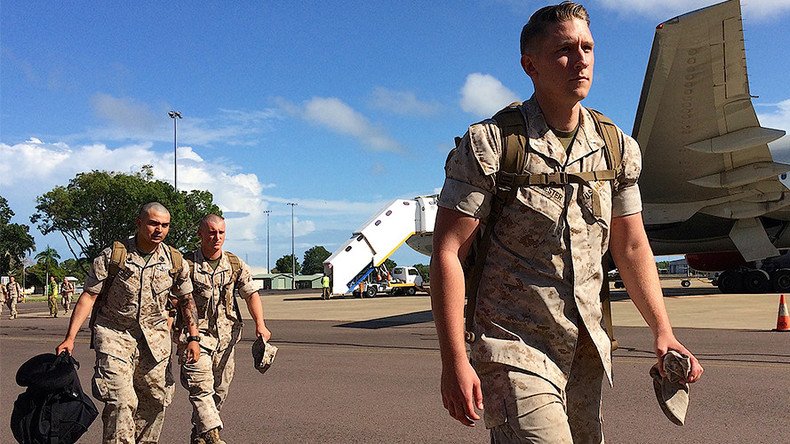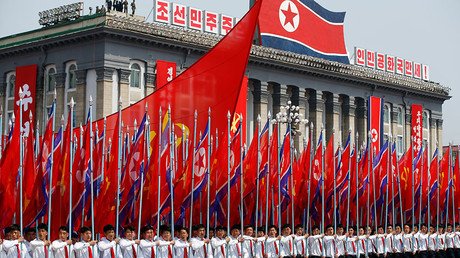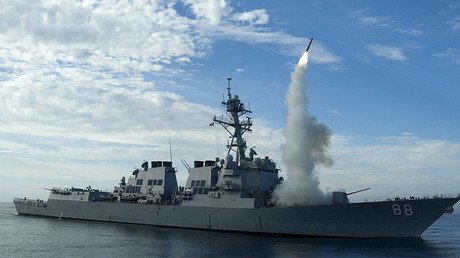‘Ready to fight & win’: US marines deployed to Australia amid N. Korean ‘nuclear threat’

US Marines have begun to touch down in Darwin, in Australia's tropical north, as the first of some 1,250 “stand ready to fight” against North Korea amid warnings that Pyongyang's nuclear weapons program is a “serious threat” to Canberra.
The deployment will see the largest US aircraft contingent to Australia in peacetime history, Reuters reports, adding that the 25-year annual deployment program was launched by former US President Barack Obama back in 2011 as part of America's ‘pivot’ to Asia. During the six-month deployment, US Marines will conduct exercises with Australian troops and will also visit Chinese forces.
The US Marines’ arrival comes as Australia’s Foreign Minister Julie Bishop voiced mounting concerns over North Korea’s nuclear activities. Pyongyang is striving for nuclear weapons and “has a clear ambition to develop an intercontinental ballistic missile capable of carrying a nuclear payload as far as the US,” Bishop said according to the ABC.
“That would mean Australia would be in reach so unless it is prevented from doing so, it will be a serious threat to the peace and stability of our region, and that is unacceptable,” she added.
North Korea launched a failed missile test on Sunday, while also warning Washington against taking military action against it. Pyongyang’s military pledged to “ruthlessly ravage” the US if the American aircraft carrier group ‘USS Carl Vinson’, currently on its way to the region, takes aggressive action. In Darwin, Marine commander Lieutenant-Colonel Brian Middleton said the 13 aircraft, including tilt-rotor Ospreys, Super Cobra helicopters and Huey helicopters, triple the number of aircraft in past deployments, signaling a “tangible kind of sign of our commitment to the region and to this partnership.”
“Regardless, I think it is just a good move anytime we can strengthen the long-standing partnership and alliance between our two countries. We stand ready to fight and win the night always,” he noted, as cited by Reuters. “I think that the commitment that we've taken to put a task force here with a conversation to get larger over the years says that we do think this is an important region.”
China’s Foreign Minister warned last week that an armed conflict with North Korea may break out “at any moment,” urging Washington and Pyongyang to tone down their hawkish rhetoric and realize the price to pay for both sides if a new Korean War were to start.
The warning came amid US military drills near the Korean Peninsula and the deployment of the American THAAD anti-missile system to South Korea. While US President Donald Trump is threatening to “take care” of the North Korean “problem,” Pyongyang says it is ready to repel any military action.
China, North Korea’s close ally and main trading partner, does not welcome Pyongyang's nuclear program, but advocates finding a political solution to the crisis. Russia, which also shares a land border with the reclusive state, expressed deep concern over the mounting tensions on the Korean Peninsula.
US ‘runs out of patience’
US Vice President Mike Pence recently announced the “end of strategic patience” towards Pyongyang, adding that “all options are on the table.”
On Thursday, US intelligence officials told NBC that the US has sent two destroyers capable of launching Tomahawk cruise missiles in the region, with one just 300 miles (some 480km) from the North Korean nuclear test site. American long-range bombers have also been positioned in Guam to hit North Korean targets.
North Korea warned on Tuesday it would retaliate “if the US dares opt for a military action” or any other type of aggression with all means available.
The North Korean General Staff said in a statement carried by the country’s KCNA news agency that US deployment of “huge nuclear strategic assets” to the Korean Peninsula is pushing the region to “a dangerous situation in which a thermo-nuclear war may break out any moment.”
On Monday, the country’s envoy to the UN echoed that statement, also warning of a nuclear war that may follow America’s military buildup. He stressed that Pyongyang will not back down to Washington’s threats and continue its missile tests whenever its suits the country since they represent part of a defensive strategy.














